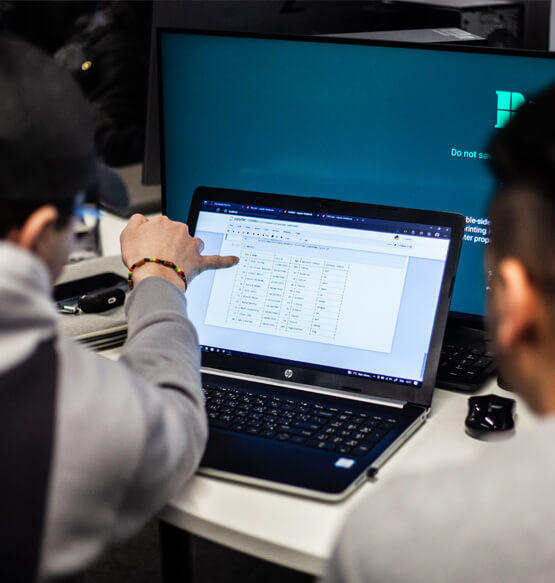/ Postgraduate Taught /
Start date:
September 2025
Duration:
September intake – 1 year (full-time)
January 2026 Intake - 1 year and 6 months (full-time)
Number of credits:
180

Postgraduate, Master's and Doctoral On Campus Open Day
Saturday 10 May 2025
Our industry-aligned curriculum, covering the latest breakthroughs from OpenAI, DeepMind and Microsoft, combined with hands-on application development using cloud-based tools, will give you the skills for cutting-edge AI roles. Gain comprehensive knowledge across machine learning, deep learning, robotics and automation while exploring AI ethics.
Did you know
Roehampton's MSc AI programme will build your future. With opportunities for industry collaboration, you'll be primed to drive innovation and unlock AI's vast potential across sectors.
This course is available as an extended masters for international students
Modules
Module overview:
This module explores the dual paradigms of natural and computational intelligence by integrating theoretical insights with practical applications. It examines the biological inspirations behind intelligent behaviour and contrasts these with computational approaches based on algorithmic design and computability.
Topics include the foundational paradigms of AI, cellular and developmental systems, evolutionary computation and algorithms, as well as behavioural, collective, and swarm intelligence, culminating in the study of hybrid systems that merge natural and computational methodologies.
The course is designed to provide you with a comprehensive understanding of how bio-inspired techniques can be applied to solve complex, multidisciplinary challenges, while addressing issues of computational efficiency, system feasibility, and the trade-offs inherent in AI system design.
This module is carefully structured to ensure that you not only gain theoretical insights but also develop practical and analytical skills necessary for advancing the field of AI through a synthesis of natural and computational approaches.
Module overview:
This module provides a comprehensive introduction to Artificial Intelligence (AI) and Machine Learning (ML), covering foundational theories, principles, and mathematical underpinnings.
You will explore intelligent agents, problem-solving through search techniques, knowledge representation, probabilistic reasoning, and optimisation methods in AI. The second half of the module focuses on machine learning methodologies, including supervised and unsupervised learning, feature engineering, and model evaluation.
Through practical implementations, you will develop skills in building intelligent systems, critically evaluating their effectiveness, and applying computational techniques to solve real-world challenges.
This module is essential for pursuing AI-related careers, as it lays the groundwork for more advanced studies in deep learning, generative AI, and Applied AI engineering.
Module overview:
This module provides an in-depth exploration of deep learning and generative AI, focusing on the theoretical foundations, state-of-the-art architectures, and practical implementations of advanced neural networks. You will study the mathematical and computational principles underlying deep learning, including backpropagation, optimisation strategies, and regularisation techniques. You will gain hands-on experience with industry-standard frameworks such as TensorFlow and PyTorch to design, train, and optimise deep learning models.
The second half of the module delves into generative AI, covering key architectures such as Variational Autoencoders (VAEs), Generative Adversarial Networks (GANs), and Diffusion Models. Special attention will be given to Transformers and Large Language Models (LLMs), which power state-of-the-art generative AI systems. You will critically assess the impact, ethical implications, and computational challenges associated with deploying these models at scale.
This module equips you with the theoretical knowledge and practical skills needed to innovate in the fields of computer vision, natural language processing, and creative AI applications.
Module overview:
The AI Systems Engineering module provides you with a comprehensive understanding of the methodologies, frameworks, and best practices for designing, deploying, and managing AI systems at scale. This module equips you with the practical and theoretical knowledge required to build end-to-end AI solutions that are scalable, reliable, and reproducible across various industries.
Through a structured learning approach, you will explore key topics such as data engineering, AI development frameworks, model development, AI deployment strategies, monitoring, and MLOps. The module also incorporates real-world case studies in healthcare and agriculture, allowing students to apply AI system engineering principles to domain-specific challenges.
A strong emphasis is placed on Responsible AI, covering ethical considerations, transparency, fairness, and compliance with data privacy regulations. By the end of this module, you will have the technical expertise and critical thinking skills needed to develop and manage AI solutions that adhere to industry standards and best practices.
This module is essential for pursuing careers in AI engineering, MLOps, data science, and AI system architecture, providing you with hands-on experience in tools such as DVC, MLflow, Kubernetes, Docker, TensorFlow Serving, and monitoring frameworks.
Module overview:
You will explore a topic of your choosing, based on your own interests as agreed and supported by a member of the academic team and produce a product and supporting report.
The project provides an opportunity for you to research and deliver a significant piece of individual work that incorporates the practical and analytical skills presented in the programme.
The final year project will enable you to explore a topic of you choice. There are four project types:
- Student-defined
- Academic-defined (research based)
- Industry-defined
- Social enterprise
These modules are those we currently offer and may be subject to change.

Skills
You'll develop essential skills for the AI industry:
- Industry-Aligned Curriculum: Learn the latest AI technologies and techniques from leading companies like DeepMind, OpenAI, and Microsoft. Study their research papers and code bases to gain exposure to cutting-edge industry applications.
- Practical Application Development: Gain hands-on experience with industry-standard tools like Azure, preparing for real-world AI development roles.
- Comprehensive Coverage: Explore all major AI domains, including machine learning, deep learning, generative AI, automation, IoT, and digital twins for a well-rounded, future-proof education.
- AI Ethics and Governance: Understand the ethical, legal, and social implications of AI to develop and deploy AI responsibly.
- Industry Collaboration: Benefit from Roehampton's partnerships with industry collaborators, offering internships, projects, and placement opportunities for valuable experience.
Learning
Instead of traditional lectures, you’ll engage with interactive video content that makes learning more dynamic and engaging.
You’ll dive into hands-on learning through group work and practical exercises, allowing you to collaborate and apply what you’ve learned in real-world scenarios.
You’ll work in lab spaces designed to mimic real IT industry environments, giving you a taste of what it’s like to work in the field and prepare you for industry challenges.


Assessment
Practical Coursework: Create projects and artefacts that grow in complexity as you progress through your studies, allowing you to demonstrate your skills and creativity.
Class Tests and Exams: Alongside your practical work, you'll take tests and exams to assess your understanding of theoretical concepts and reinforce your learning.
Portfolio Development: Build a detailed portfolio of your work, which will help you showcase your skills and achievements to potential employers.
Careers
Upon graduation you will be prepared for various roles, including:
- AI Software Engineer/Developer: Build and deploy cloud-based AI software solutions using tools like Python, .NET, Git, and Azure. Develop intelligent systems for various applications.
- Machine Learning Engineer: Develop and deploy machine learning models with a strong foundation in supervised and unsupervised learning, neural networks, and reinforcement learning.
- Automation Engineer: Create intelligent systems for manufacturing, logistics, and other industrial domains with expertise in robotics, IoT, digital twins, and Industry 4.0/5.0.
- AI Research Scientist/Engineer: Engage in research-oriented roles with theoretical foundations in computational intelligence and exposure to the latest AI research.
- AI Consultant/Analyst: Advise organisations on AI strategy, implementation, and responsible use with broad knowledge of AI concepts and techniques.

Open days
Get a real taste of our campus, community and what it’s like to study at Roehampton
Applying
Full-time UK postgraduate students apply through our direct application system.
Course subject to curriculum review and validation.
Entry tariff
General entry requirements
Specific entry requirements
A degree in computing.
September 2025 entry tuition fees (UK)
| Level of study | Full-time |
| MSc | £11,250 |
We offer a wide range of scholarships and bursaries. See our financial support pages for UK students.
We also provide other ways to support the cost of living, including free buses and on-campus car parking, hardship support and some of the most affordable student accommodation and catering in London. Find out more about how we can support you.
International undergraduate students apply through our direct application system.
Course subject to curriculum review and validation.
Entry tariff
General entry requirements
Specific entry requirements
A degree in computing.
September 2025 entry tuition fees (international)
| Level of study | Full-time |
| MSc | £18,250 |
We offer a wide range of scholarships and bursaries. See our financial support pages for international students.
We also provide other ways to support the cost of living, including free buses and on-campus car parking, hardship support and some of the most affordable student accommodation and catering in London. Find out more about how we can support you.





